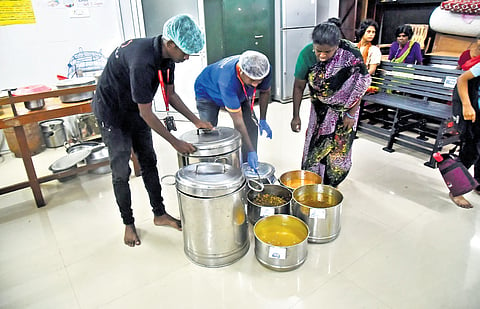

CHENNAI: "How can food not be wasted?” This simple yet profound question posed by a girl in class 4 at a Coimbatore government-aided school prompted three production engineering graduates to set up ‘No Food Waste’, an NGO reallocating surplus food to those needing it the most since 2014.
Soon after graduating from Coimbatore’s Government College of Technology, the trio of Padmanaban Gopalan, Dinesh Manickam, and Sudhakar Marimuthu, decided to set off an awareness campaign against wastage of food in schools and colleges after realising that the absurd practice of wasting food were getting repeated in several marriages and other functions. So nearly 10 years ago, they went to raise awareness against food wastage among elementary school students at the invitation of the principal of the government-aided school. While interacting with the students, the rather precocious girl in class 4 got up and asked them about how they can avoid food being wasted.
“In weddings, so many items are served, and the banana leaf is taller than her. So, she cannot finish all the food,” Gopalan fondly recollects their eventful interaction with the girl whose innocuous questions floored them and stirred them into establishing No Food Waste. “We realised that merely creating awareness was not enough. So, we decided to collect surplus food from marriage halls, restaurants, and functions and distribute it to the needy,” he said.
Today, the triumvirate, instrumental for the Tamil Nadu state government in bringing policy changes to reduce food waste, has opened 26 chapters of their NGO across Tamil Nadu, Andhra Pradesh, and Telangana.
“When we posted it on social media, the first call we got was about surplus food from a family who conducted a house-warming ceremony. We managed to buy packing materials, including banana leaves. We had no idea how to pack it and collect it. Taking two carry bags, we went to the place in a bus by spending Rs 12, collected food and distributed it to 52 people,” said Gopalan.
Gradually, it became a movement. More people started donating, and the Rotary Club donated a vehicle for transporting food. They started off by distributing at dumpyards, shelter homes, and hospitals the food collected. From 52 plates per day, it increased to 9,000 to 10,000 plates a month. Today, in all three states, the NGO distributes seven to eight lakh plates of food per month. “In India, 30–35% of food produced is going to waste. So, maybe we have contributed to a 10% reduction in waste,” Gopalan said. They are also making use of technology to reduce the wastage of food. “We have developed tools for food waste auditing which tell the user how much and which food item is wasted.”
The three youngsters even prompted the Food Safety and Standards Authority of India (FSSAI) to create a provision for safe donation. “Initially, there was no provision. We didn’t know if any licence should be obtained for collecting and distributing food. We approached FSSAI. So, they created a provision in the FSSAI Act. They also launched the Safe Food and Share Food initiative, which is implemented in Tamil Nadu,” said Gopalan.
The TN Food Safety Department has also been training the volunteers handling food on how to check the quality of food, how to pack it, and how to distribute safe food. TN also formed a state-level committee for food recovery in which wedding hall owners, hoteliers, and catering service companies are members. They are also helping in creating awareness, supporting the recovery of food, and giving all kinds of support, including vehicles.
Arunkumar, regional director, Chennai Chapter, No Food Waste, said “Every day we hear some new stories as we distribute food packets in places like Marina Beach, hospitals, and communities where there is a need for food. We do food auditing to see if they really require food in the particular area before we donate food,” said Arunkumar.
And distributing food has brought some new insights for the NGO. “One day when I was distributing food packets at night in Marina, a well-dressed man asked for a packet. He also wanted two more packets for his mother and sister. He had come from another district for his sister’s cancer treatment. He was sleeping at the beach because the hospital was nearby. We got to meet such people for whom the food is precious,” Arunkumar added. The NGO also has a community kitchen in Pallikaranai in Chennai, where they also cook and distribute food in case of emergencies like floods.
(The helpline number to donate food is 9087790877)
(Edited by Armstrong Chanambam)